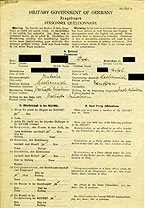Schrift: größer/kleiner
Inhaltsverzeichnis
Sie sind hier: WirRheinländer > english version > Allied Occupation and „Trizonesia“ (1945 - 1949) > Denazification
Allied Occupation and "Trizonesia" (1945-1949)
Denazification
The reorganisation of politics and administration at the Rhine and Ruhr was carried out in the shadow of the inherited burden of National Socialism. Before the Potsdam Conference in the summer of 1945, the British and Americans were already trying to get hold of important officials of the Hitler régime in the Rhineland and their supporters in society and the economy. It was not until 1946 that what began as "wild denazification" led to an orderly process.
The victorious powers carried out "denazification" as a combination of juristic criminal prosecution, political purge and ideological re-education. Despite law No.24, jointly drawn up by the Control Commission on 12th January in 1946, concerning the "removal of National Socialists and persons who are hostile to the aims of the Allies, from public office and responsible positions" they did not proceed in a uniform way. In the Rhineland and in Westphalia the British and Americans issued the first questionnaires shortly after they had invaded, on which the military authorities based decisions concerning the suitability of respondents for certain professions, departments or public office. The questionnaires were later extended to 133 questions, including details about the life, occupation and political past, in particular of members of the civil service, as well as people in leading positions in trade and industry. At the same time, entire occupational groups in trades, agriculture and retail were completely disregarded.

From the spring of 1946 German "denazification committees" were set up in the future Federal Land of North Rhine-Westphalia in all urban and rural councils, as well as in regional governments, whereby the churches were allowed to have their own commissions. At first, these committees were only entitled to make recommendations to the British Military Government, which had been solely responsible for this since July 1945, which would then reach a decision on the person under scrutiny. One year later the practice of judging such people became more complex. From then on, a difference was made between "principal offenders"/"criminals", "incriminated"/"wrong-doers", "incriminated to a lesser degree"/"activists", "fellow-travellers" and "exonerated", whereby the British retained the authority to judge the first two categories. The system had a punishment for every category, e. g. labour camp, confiscation of property, cash fines, exclusion from the civil service, professional demotion, revocation of the right to vote, or restrictions in freedom of movement. In North Rhine-Westphalia about 800,000 people, i.e. about 10% of the population over 18 years of age, were scrutinized. Around 75% were classified as „exonerated", about 20% as „fellow-travellers" and approximately 4% as "incriminated to a lesser degree"/"activists". Only 1-2% fell into the categories "principal offenders"/„criminals" or "incriminated"/"wrong-doers".
While the initial investigations were still running, the desolate situation in their zone forced the British Military Government to consult German specialists. Step by step, they granted these advisors more responsibility and authority, until in August 1946 the first civilian government of the Federal Land North Rhine-Westphalia was appointed in Düsseldorf. The most visible evidence of the growing influence of German experts on the British, Americans and French was the currency reform of June 1948 which, with the assistance of German economists, introduced the "Deutschmark" as the new currency in West Germany and West Berlin.


